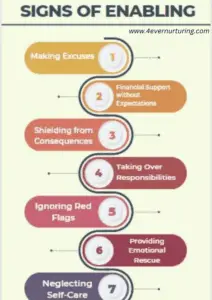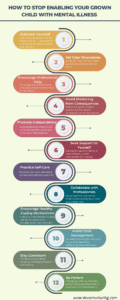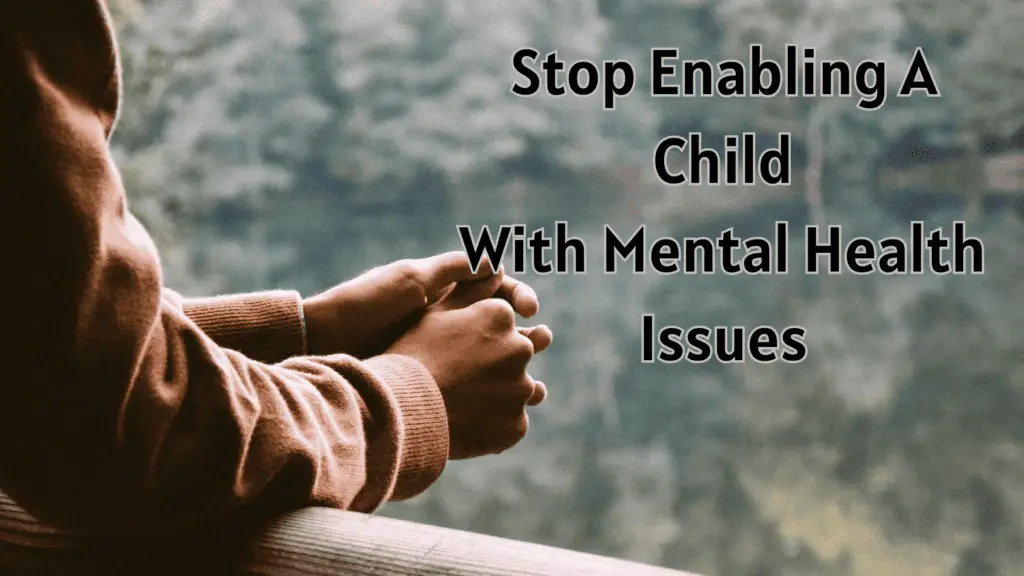Enabling is a well-intentioned but often harmful behavior that occurs when someone, often a parent or caregiver, inadvertently fosters unhealthy or destructive patterns in another person’s life. The enabler typically does this out of love, compassion, or a desire to protect. But it can lead to detrimental consequences for both parties involved. Enabling can occur in various relationships, but in this article, we will focus on the specific issue of enabling a grown child with mental illness. And get to know how to stop enabling your grown child with mental illness.
When a person has a mental illness, their struggles can be incredibly challenging for both the individual and their loved ones. It is natural for parents to want to help and support their child, regardless of age. However, as the child reaches adulthood, the dynamics of the parent-child relationship must evolve. Unfortunately, some parents may unknowingly fall into patterns of enabling their grown child’s unhealthy behaviors related to their mental illness, which can impede their progress toward recovery and independence.
Signs of Enabling
So, what are some signs that you are enabling a child? Below are some of the common signs:
- Making Excuses: Enablers may frequently make excuses for their grown child’s problematic behavior, often attributing it to their mental illness rather than holding them accountable for their actions. This can prevent the child from understanding the consequences of their behavior and hinder their motivation to change.
- Financial Support without Expectations: Providing continuous financial assistance without setting clear expectations or boundaries can enable the child to avoid facing the challenges that come with managing their own finances and responsibilities. They may become dependent on their parents rather than learning to support themselves.
- Shielding from Consequences: Enablers may shield their grown child from the natural consequences of their actions, which can inhibit the child’s growth and self-awareness. Shielding them from the fallout of their behavior prevents them from recognizing the need for personal responsibility and change.
- Taking Over Responsibilities: Enablers might take over responsibilities that the child should be handling independently. Whether it’s doing household chores, managing appointments, or making important life decisions, this behavior prevents the child from developing essential life skills and problem-solving abilities.
- Ignoring Red Flags: Ignoring or downplaying signs of substance abuse, self-destructive behavior, or emotional instability can be detrimental. By turning a blind eye to these issues, enablers inadvertently hinder their child’s ability to seek professional help and access appropriate treatment.
- Providing Emotional Rescue: Constantly swooping in to rescue the child from emotional distress or difficult situations can reinforce their dependence on the parent. This prevents the child from developing coping mechanisms and emotional resilience.
- Neglecting Self-Care: Enablers may neglect their own needs, prioritizing their grown child’s well-being over their own. This can lead to emotional burnout and diminish their ability to provide constructive support in the long run.

Consequences of Enabling
Enabling behaviors can have severe consequences for both the enabler and the enabled grown child, particularly concerning their mental health and personal growth. By shielding the child from the impact of their actions, enabling prevents them from recognizing the need for change and seeking help. It fosters a sense of dependency, where the child relies on their parents rather than developing the skills to manage their mental health and life challenges independently.
Moreover, enabling can perpetuate a cycle of dysfunction, making it challenging for the grown child to break free from destructive patterns. It inhibits the development of coping mechanisms and problem-solving skills, leaving the child ill-equipped to handle life’s challenges effectively. As a result, the child’s self-esteem and self-efficacy may suffer, perpetuating a cycle of low motivation and hopelessness.
Read About: Ways on How to Tire Out an Autistic Child
Reasons for Enabling
Why would a parent enable a child when they are of the consequences? Well, at times the reasons might be reasonable and at times unreasonable.
- Guilt: Parents may feel guilty about their child’s mental illness, wondering if they did something wrong or could have prevented it. This guilt can lead them to overcompensate by providing excessive support or avoiding confrontations, hoping to ease their conscience and make up for perceived past shortcomings.
- Fear of Abandonment: Parents may fear that setting boundaries or holding their grown child accountable for their actions will push them away or strain the relationship. They worry that the child might feel rejected or abandoned, so they opt to enable in an attempt to maintain closeness and avoid potential conflict.
- Desire to Protect: Parents may genuinely want to shield their grown child from the harsh realities and consequences that often accompany mental illness. They believe they are acting out of love and compassion, wanting to spare their child from pain and hardship.
- Hope for Change: Enablers often hold onto the hope that if they provide enough support and assistance, their grown child will eventually overcome their mental health struggles. They may believe that their enabling behavior is a necessary stepping stone towards recovery.
- Fear of Crisis: Parents may fear that confronting their child’s behavior or refusing to enable could trigger a crisis or exacerbate their mental health issues. They may worry that tough love or setting boundaries might lead to dangerous behavior or suicidal ideation.
- Lack of Knowledge: Some parents may not fully understand the complexities of mental illness, leading them to believe that constant support and accommodation are the best ways to help their grown child. They may be unaware that enabling can actually hinder their child’s progress.

Unhelpfulness of Enabling
While the motivations behind enabling a grown child with mental illness are understandable and driven by love and concern, these behaviors can ultimately be unhelpful and counterproductive for both the parent and the child.
Here are some ways they can be unhelpful:
- Sustaining Dependence: Enabling perpetuates the child’s dependence on the parent, hindering their ability to develop essential life skills and coping mechanisms. It prevents the child from taking responsibility for their actions and seeking professional help when needed.
- Stifling Growth: By shielding the child from the consequences of their behavior, enabling can prevent them from learning valuable life lessons. Growth and personal development often come through facing challenges and overcoming obstacles, which enabling denies the child.
- Reinforcing Unhealthy Patterns: Enabling can inadvertently reinforce negative behaviors and patterns associated with the child’s mental illness. It creates a cycle where the child’s issues remain unresolved, and the parent continues to be stuck in a role that is emotionally draining.
- Straining the Relationship: Over time, enabling behaviors can strain the parent-child relationship. As the child becomes increasingly dependent, the parent may become resentful or emotionally exhausted, leading to tension and conflict.
- Delaying Treatment: Enabling can delay the child from seeking appropriate treatment or professional help for their mental health issues. Without experiencing the consequences of their actions, the child may not recognize the urgency of seeking support.
Read About: How to Motivate a Teenager with Depression
How to Stop Enabling Your Grown Child with Mental Illness
Stopping enabling behavior is essential for supporting a grown child with mental illness. Enabling can unintentionally contribute to their dependency and hinder their progress toward recovery. Here are some steps on how to stop enabling your grown child with mental illness. These are focused to also help you to promote healthier coping mechanisms:
1. Educate Yourself: Learn more about your child’s specific mental illness and the most effective ways to support their recovery. Understanding the challenges they face will help you develop a more informed approach to providing assistance.
2. Set Clear Boundaries: Establish clear and reasonable boundaries with your grown child. Clearly communicate what behaviors are acceptable and what consequences may result from crossing those boundaries. Stick to these boundaries consistently to foster accountability.
3. Encourage Professional Help: Encourage your child to seek professional treatment for their mental illness. Offer your support in finding appropriate resources, such as therapists, psychiatrists, or support groups, and emphasize the importance of consistent treatment.
4. Avoid Sheltering from Consequences: Allow your grown child to experience the natural consequences of their actions. By facing the outcomes of their behavior, they can develop a greater sense of responsibility and understanding of how their actions affect their life.
5. Promote Independence: Encourage your child to take on responsibilities and make decisions independently. Gradually increase their level of autonomy, supporting them in developing life skills and problem-solving abilities.

6. Seek Support for Yourself: Caring for a grown child with mental illness can be emotionally challenging. Consider seeking support for yourself through therapy, support groups, or counseling to help navigate the complexities of the situation and manage your emotions.
7. Practice Self-Care: Prioritize your own well-being and practice self-care regularly. Taking care of yourself physically and emotionally will enable you to be more effective in providing appropriate support to your child.
8. Collaborate with Professionals: Work together with mental health professionals involved in your child’s care. Stay informed about their treatment plan and progress, and collaborate with the professionals to ensure a consistent and comprehensive support system.
9. Encourage Healthy Coping Mechanisms: Help your child develop healthy coping mechanisms to manage stress and emotions. Encourage hobbies, physical activities, or mindfulness practices that can positively impact their mental well-being.
10. Avoid Crisis Management: Instead of waiting for a crisis to occur, be proactive in addressing potential issues. Implementing preventive measures and early interventions can reduce the likelihood of a crisis arising.
11. Stay Consistent: The key to successfully stopping enabling behaviors is consistency. Stick to the boundaries and strategies you’ve set, even if it feels difficult or emotionally challenging.
12. Be Patient: Changing enabling behaviors and promoting independence may take time and patience. Be compassionate with yourself and your child during this process and celebrate small victories along the way.
Final Remarks
Enabling a grown child with mental illness can be a difficult pattern to break, but it’s essential for both the parent’s well-being and the child’s long-term recovery. By recognizing the signs of enabling, understanding the reasons behind it, and implementing strategies for change, parents can help their child take responsibility for their own life and find the support they need to thrive.
Through the transformation from enabling to empowering, you can cultivate a relationship that fosters personal growth, resilience, and hope. By providing appropriate support and encouragement, you can help your grown child build a life filled with fulfillment, purpose, and the ability to manage their mental health effectively. Embrace the positive potential for change, and together, you can navigate this path with strength, love, and hope for a brighter future.







